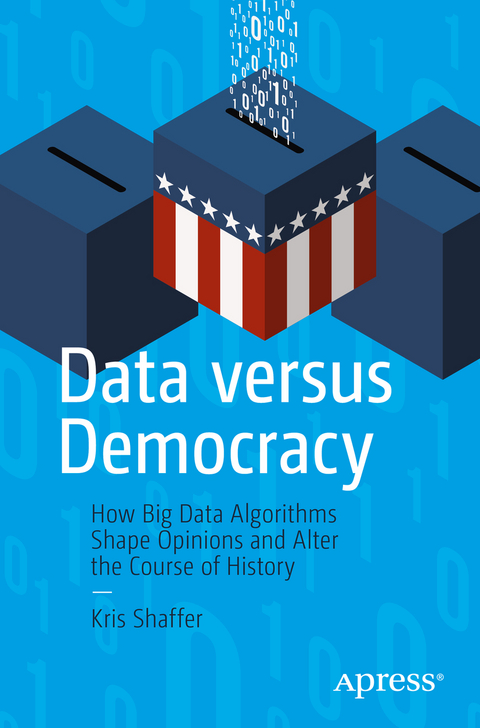
Data versus Democracy
Apress (Verlag)
978-1-4842-4539-2 (ISBN)
In this book, algorithmic recommendations, clickbait, familiarity bias, propaganda, and other pivotal concepts are analyzed and then expanded upon via fascinating and timely case studies: the 2016 US presidential election, Ferguson, GamerGate, international political movements, and more events that come to affect every one of us. What are the implications of how we engage with information in the digital age? Data versus Democracy explores this topic and an abundance of related crucial questions. We live in a culture vastly different from any that has come before. In a society where engagement is currency, we are the product. Understanding the value of our attention, how organizations operate based on this concept, and how engagement can be used against our best interests is essential in responsibly equipping ourselves against the perils of disinformation.
Who This Book Is For
Individuals who are curious about how social media algorithms work and how they can be manipulated to influence culture. Social media managers, data scientists, data administrators, and educators will find this book particularly relevant to their work.
Kris Shaffer, Ph.D., is a data scientist and Senior Computational Disinformation Analyst for New Knowledge. He co-authored "The Tactics and Tropes of the Internet Research Agency," a report prepared for the United States Senate Select Committee on Intelligence about Russian interference in the 2016 US presidential election on social media. He has consulted for multiple US government agencies, non-profits, and universities on matters related to digital disinformation, data ethics, and digital pedagogy. In a former (professional) life, Kris was an academic and digital humanist. He has taught courses in music theory and cognition, computer science, and digital studies at Yale University, University of Colorado–Boulder, University of Mary Washington, and Charleston Southern University. He holds a PhD from Yale University.
Part I: The Propaganda Problem.- Chapter 1: Pay Attention: How Information Abundance Affects the Way We Consume Media.- Chapter 2: Cog in the System: How the Limits of Our Brains Leave Us Vulnerable to Cognitive Hacking.- Chapter 3: Swimming Upstream: How Content Recommendation Engines Impact Information and Manipulate Our Attention.- Part II: Case Studies.- Chapter 4: Domestic Disturbance: Ferguson, GamerGate, and the Rise of the American Alt-Right.- Chapter 5: Democracy Hacked, Part 1: Russian Interference and the New Cold War.- Chapter 6: Democracy Hacked, Part 2: Rumors, Bots, and Genocide in the Global South.- Chapter 7: Conclusion: Where Do We Go from Here?.-
| Erscheinungsdatum | 12.07.2019 |
|---|---|
| Zusatzinfo | 2 Illustrations, black and white; XVII, 120 p. 2 illus. |
| Verlagsort | Berkley |
| Sprache | englisch |
| Maße | 155 x 235 mm |
| Themenwelt | Informatik ► Datenbanken ► Data Warehouse / Data Mining |
| Informatik ► Theorie / Studium ► Algorithmen | |
| Informatik ► Theorie / Studium ► Künstliche Intelligenz / Robotik | |
| Mathematik / Informatik ► Mathematik ► Analysis | |
| Mathematik / Informatik ► Mathematik ► Finanz- / Wirtschaftsmathematik | |
| Mathematik / Informatik ► Mathematik ► Wahrscheinlichkeit / Kombinatorik | |
| Sozialwissenschaften ► Kommunikation / Medien ► Medienwissenschaft | |
| Wirtschaft ► Betriebswirtschaft / Management | |
| ISBN-10 | 1-4842-4539-3 / 1484245393 |
| ISBN-13 | 978-1-4842-4539-2 / 9781484245392 |
| Zustand | Neuware |
| Haben Sie eine Frage zum Produkt? |
aus dem Bereich


